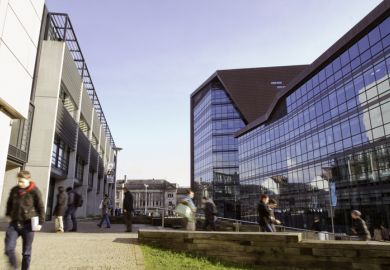This weekend I watched the celebration of the life of my dear friend Lee Thompson in Boulder, Colorado. A former president of Nafsa, the Association of International Educators, she opened her heart to me when I was a young international scholar at the University of Colorado Boulder. She showed me by example how to be a true friend to the “stranger in our midst”.
Having previously studied alongside overseas students, Lee – who by then was a doctoral student and head of the Boulder Friends of International Students organisation – showed me what it meant to be made genuinely welcome in an academic community. She was a teacher in the truest sense. Her support at a critical time in my career helped me to be a husband, father and teacher. Her guidance brought me through tough times to a full and good life. And the memories shared by other international students at her memorial service made me realise I was far from alone.
All this made me think of my colleagues here and now in the UK. I wanted to tell them how much their teaching will mean to the strangers in their own midst. I want them to be deeply proud of what they do every day.
But how are UK academics to think in these terms about the deep values of higher education when they are trying to do their very best in the face of so many challenges – not least to their living standards? How can I ask them to take such a high-minded perspective when they are on strike for better pay and pensions?
So why are things so tough? Weren’t tuition fees supposed to give UK universities a sustainable future?
To be clear, I never thought UK students should pay for their education. I opposed the introduction of tuition fees when I was a vice-chancellor, and I said so to a parliamentary committee. But it was a minority view and we now have a system that burdens our youth and condemns universities to a fixed income for teaching domestic students forever. It is a fixed income because, although the £9,000 cap introduced in 2012 was raised by 2.8 per cent in 2017 to £9,250, I don’t believe that any government will ever feel able to increase it further. It would be £13,050 if it had kept pace with inflation, but which political party would wish to promote that to an electorate already feeling the pain of rising prices all around them?
So we are left with a major challenge to preserve our academe, and one that won’t be satisfied with minor policy interventions at the edges. But one thing we must certainly keep on doing is earning income from international students.
Let’s be clear: international recruitment has been our only option and an enormous blessing to us. It has without doubt saved our bacon in teaching and research, cross-subsidising the latter to the tune of one pound in four.
But the benefits aren’t confined to universities. Time after time we see from economic impact surveys that the wider economic impact of international education is enormous and spread right across the UK, a genuine engine of levelling up. According to the latest figures, the net value of international students to the UK is now £41.9 billion – equivalent to approximately £560 per citizen.
And many of these students are themselves creators of knowledge. Take the Indian PhD student I recently met at the Royal Society, who is undertaking research into childhood epilepsy at a London teaching hospital, work that will transform young lives in her country and ours.
But we now have major challenges as our international student body continues to grow. Immigrants – even temporary ones – can easily be blamed for social ills. If we want to keep our welcome genuine, we will need, for instance, to work with governments and housing providers to address the shortages of housing that are afflicting some towns and cities. Local and national politicians should work with us to enable this, just as they would actively smooth the road for any other major inward investment of this scale and public benefit.
But for academic colleagues it goes deeper. We can also be proud of the benefits we have given to our students across the world, with a growing body of our alumni having a long-term connection to and affection for the UK. Yes, academics are busy battling against an ill-informed funding system that without their work would have run us all into the ground. And, at the same time, they are fighting back against a narrow view of what academic life is really about. But they are also offering an education that offers opportunities to talented young people from across the world.
In the four decades since Lee Thompson first welcomed me to the US, I have in my turn seen the good done by my own students, and I am truly, deeply proud to have been a part of something so wonderful. However hard-pressed they might currently feel, UK academics should feel that pride too.
Sir Keith Burnett is the former vice-chancellor of the University of Sheffield and co-founder of the #WeAreInternational campaign.
Register to continue
Why register?
- Registration is free and only takes a moment
- Once registered, you can read 3 articles a month
- Sign up for our newsletter
Subscribe
Or subscribe for unlimited access to:
- Unlimited access to news, views, insights & reviews
- Digital editions
- Digital access to THE’s university and college rankings analysis
Already registered or a current subscriber?








